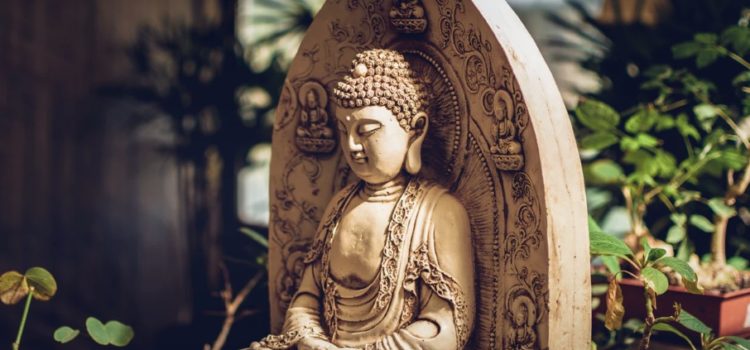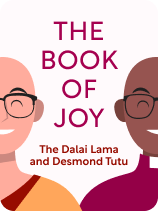

This article is an excerpt from the Shortform book guide to "The Book of Joy" by The Dalai Lama, Desmond Tutu, and Douglas Abrams. Shortform has the world's best summaries and analyses of books you should be reading.
Like this article? Sign up for a free trial here.
What does Buddhism say about suffering? What are the three truths about suffering?
Suffering is a normal part of life, and there are many lessons that we can learn from it. Desmond Tutu and the Dalai Lama’s book The Book of Joy claim that in order to feel joy, you need to fully understand the role suffering plays in your life.
Keep reading to learn more about suffering in Buddhism.
Suffering in Buddhism
Practicing joy often becomes more difficult when you’re in the midst of suffering. Many people believe their own suffering or the immense suffering in the world means they can’t (or shouldn’t) feel joy. We’ll explain the truths about suffering in Buddhism, why suffering doesn’t prevent you from experiencing joy, and how it can sometimes even lead you to greater joy.
(Shortform note: The inability to feel joy in the face of suffering often leads to feelings of despair—a feeling of hopelessness that something is wrong and will never change for the better. People can feel despair about specific parts of their life, like their relationships or job prospects, or despair about their life or the future of the world. For example, in recent years, mental health professionals have seen a rise in what has been coined “climate despair,” an overwhelming feeling of hopelessness and powerlessness to prevent or mitigate the catastrophic impacts of climate change.)
Suffering is inevitable, but Tutu and the Dalai Lama argue that it doesn’t have to affect your overall capacity for joy. They offer three truths about suffering that can help you turn back to joy in the midst of fear, anger, envy, sadness, isolation, and even death.
The First Truth: You Can Control How You Respond to Suffering
Much of our suffering is beyond our control. You might suffer because of a natural disaster, war, or an unexpected flooded basement. These are external circumstances that you can’t change. While this type of suffering is inevitable, the Dalai Lama explains that much of human suffering is avoidable because it’s caused by our emotional response to our circumstances.
The Dalai Lama advocates for cultivating equanimity (what he calls “mental immunity”), the ability to maintain a calm and positive state of mind even in the face of adversity. Cultivating equanimity will help you minimize the internal suffering caused by negative emotions like anxiety, anger, envy, sadness, and loneliness.
Tutu and the Dalai Lama explain that fear is often the root cause of our negative emotions and therefore the cause of much of our internal suffering. In the next section, we’ll outline some strategies you can use to build up your mental resilience to negative emotions that stem from fear.
The Second Truth: Suffering Is a Universal Human Experience
According to Tutu and the Dalai Lama, the second truth to accept is that suffering is inevitable and universal. Every person experiences suffering, whether it’s the loss of a loved one or the trauma of war. In response to suffering, we often feel negative emotions like sadness or loneliness. However, recognizing the shared experience of suffering can be a balm against it because suffering is one of the things that connects us to other people.
The Third Truth: Suffering Can Lead to Insight or Opportunity
Suffering has the potential to leave you bitter or resentful, but if you choose to find meaning in your suffering, it can also give you the opportunity to grow. Tutu and the Dalai Lama argue that compassion and generosity of spirit rarely come without suffering. For example, if you’ve experienced what it’s like to be physically impaired, you’re more likely to feel compassion when someone else has a similar experience.
When suffering truly feels pointless, Tutu and the Dalai Lama counsel to remember that suffering often leads to joy. They explain that joy is not the antithesis of suffering—it’s what comes after suffering. Experiencing something hard allows you to better appreciate moments of joy. For example, when you’ve experienced a temporary physical ailment, you’re even more grateful when you regain your health and mobility.
Tutu and the Dalai Lama acknowledge that humanity’s fear and anxiety around death may be one of our greatest sources of suffering. Many of us live in fear of our own mortality. However, they explain, death is yet another part of life that’s beyond your control. It’s not only natural and inevitable, but necessary. As with other sources of suffering, you can find meaning in death. Knowing that our life spans are limited offers inspiration to live intentionally, in service of others, and, ultimately, in service of joy.

———End of Preview———
Like what you just read? Read the rest of the world's best book summary and analysis of The Dalai Lama, Desmond Tutu, and Douglas Abrams's "The Book of Joy" at Shortform.
Here's what you'll find in our full The Book of Joy summary:
- Archbishop Desmond Tutu and His Holiness the Dalai Lama's guide to joy
- What joy actually is and why it matters so much
- How to find joy exactly where you are, no matter what your life looks like






